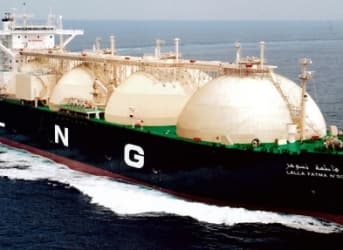One major knock on effect from the oil bust is the collapse in prices for liquefied natural gas (LNG).
Unlike oil, which largely trades on an open market and fluctuates depending on supply and demand, natural gas trades differently in different places. In the U.S., natural gas trades much more openly than in Europe and Asia, which have historically linked the price of gas to the price of crude oil.
That created a huge opportunity for natural gas producers in the U.S., who wanted to profit off of their cheap supplies by exporting to Europe and Asia where prices were often much higher. The spread between the different regional markets widened significantly after the Fukushima meltdown, as Japan’s energy needs went into overdrive after the country moved to shut down more than 50 nuclear reactors. The Platts Japan Korea Marker (JKM), a benchmark price for the spot market in Asia, surged to price levels nearly three or four times as high as those found in the United States.
But LNG prices are crashing back to Earth, falling in tandem with the collapse in crude. And while LNG may benefit if oil prices rebound, a variety of factors could prevent prices from bouncing back to their highs during the 2011-2014 period.
First, economic growth in Asia remains unimpressive. China’s GDP grew at its slowest rate in a quarter century in 2014. The world’s largest LNG importer, Japan, has seen modest economic improvements over the past year, but growth is still weak. South Korea actually imported 9 percent less LNG in 2014 compared to a year earlier.
Second, and more importantly, Japan is moving closer to restarting some of its nuclear reactors. Although only one or two may actually come back online in 2015, a gradual return to nuclear power will seriously cut into Japan’s LNG demand. Japan’s LNG imports may fall this year.

Third, a massive volume of LNG export capacity is about to flood the market over the next two to three years. Global export capacity is expected to surge by 34 percent, jumping from 290 million tonnes per annum (mtpa) at the end of 2013 to almost 400 mtpa by 2018. Australia in particular is in the midst of a massive LNG construction phase, with export capacity expected to more than triple over the next 3 years.
As such, LNG prices may suffer longer than oil prices. LNG prices in Asia may average just $10.30 per million Btu (MMBtu) in 2015, a 38 percent decline from last year. Worse yet, they are not expected to recover anytime soon – analysts at Australia & New Zealand Banking Group Ltd. predict they will average $10 in 2016, half of what they were during the peak years following the Fukushima meltdown. Current contract prices are going for around $12 to $14/MMBtu, but the most recent spot market prices have plummeted to a mere $6.65/MMBtu, the lowest level in almost five years, Bloomberg reports.
See the two FERC maps from 2013 and 2015 to get a sense of the dramatic change in prices.


Market watchers expect oil prices to begin to rebound towards the end of 2015. While that will ripple through to LNG, the wave of new LNG export capacity coming online may prevent LNG prices from rising, even if oil sees a strong recovery.
Moreover, as the FT noted in a January 4 article, the LNG market often takes much longer to balance out. Building export terminals requires huge upfront capital costs, but once completed, operating costs are relatively low. That means exporters have fewer incentives to shut in capacity, delaying the convergence towards some sort of supply and demand equilibrium.
In other words, LNG prices could remain depressed for some time.
By Nick Cunningham of Oilprice.com


















